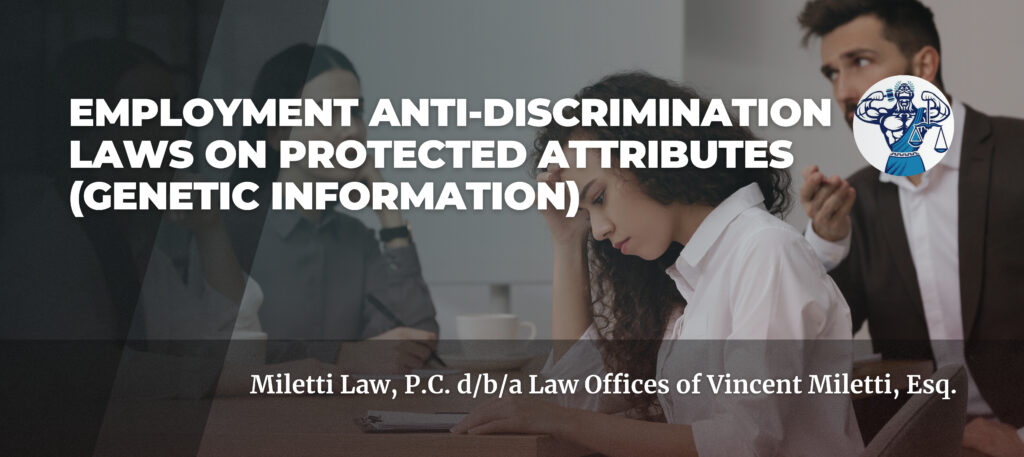Here at the Law Office of Vincent Miletti, Esq. and the home of the #UnusuallyMotivated movement, we take pride as a resilient and dependable legal services firm, providing such services in both a traditional and online, web-based environment. With mastered specialization in areas such as Employment and Labor Law, Intellectual Property (IP) (trademark, copyright, patent), Entertainment Law, and e-Commerce (Supply Chain, Distribution, Fulfillment, Standard Legal & Regulatory), we provide a range of legal services including, but not limited to traditional legal representation (litigation, mediation, arbitration, opinion letters and advisory), non-litigated business legal representation and legal counsel, and unique, online legal services such as smart forms, mobile training, legal marketing and development.
Still, we, here at Miletti Law®, feel obligated to enlighten, educate, and create awareness, free of charge, about how these issues and many others affect our unusually motivated® readers and/or their businesses. Accordingly, in order to achieve this goal, we have committed ourselves to creating authoritative, trustworthy & distinctive content, which looks to not only educate, but also deliver in a manner that only Miletti Law® can. Usually, this content is featured as videos posted on our YouTube Channel https://www.youtube.com/channel/UCtvUryqkkMAJLwrLu2BBt6w and blogs that are published on our website WWW.MILETTILAW.COM. With that, the ball is in your court and you have an effortless obligation to subscribe to the channel and sign up for the Newsletter on the website, which encompasses the best way to ensure that you stay in the loop and benefit from the knowledge bombs that we drop here!
To achieve our goal of keeping you informed, this blog is Part XI and an update of our series on federal laws that apply to the issues of workplace harassment, discrimination, & retaliation in New York. In Part X, we provided you with an overview of “Harassment Claims” as recognized under the various federal laws. Accordingly, to move the discussion forward, we will hammer on “Vicarious Liability for Harassment” & “Same-Sex Harassment” as recognized by applicable federal laws in this blog and part XI of the series.
Vicarious Liability for Harassment recognized under Federal Laws Applicable to Workplace Harassment, Discrimination, & Retaliation in New York.
Generally speaking, vicarious liability refers to liability borne by a supervisory party (who may be an employer) for the actionable conduct of an associate or subordinate (who may be an employee) on the basis of the relationship the two parties have.
Title VII of the Civil Rights Act of 1964 (Title VII)
Under Title VII, it is presumed that the vicarious liability for harassment is borne by a harasser of an employer where the harassment in question culminates in a tangible employment action and the harasser is a supervisor. However, if no tangible employment action has culminated from the alleged harassment, then an affirmative defense may be applied to overcome this presumption. Usually, two elements make up such an affirmative defense – (1) that the plaintiff employee unreasonably failed to avoid harm or take advantage of any corrective or preventative opportunities that the employer provided and (2) that reasonable care through which any sexually harassing behavior could be promptly corrected and prevented was exercised by the employer.
For the purposes of determining who should be vicariously liable for harassment under Title VII, an employee is a supervisor if the employer has empowered such an employee to undertake tangible actions against the victim. However, suppose an employer’s negligence in controlling working conditions is established. In that case, such an employer is held directly liable for unlawful harassment committed by an employee if the “plaintiff” has been harassed by a “coworker.”
Age Discrimination in Employment Act (ADEA)
Under the ADEA, an employer is presumed to be vicariously liable for an actionable hostile environment that a supervisor who has successively higher or immediate authority over an employer creates. However, although such a claim is usually subject to proof by a preponderance of the evidence, an affirmative defense to damages or liability may be raised by the defending employer in situations where no tangible employment action is taken.
Section 1981
When it comes to vicarious liability of harassment, Section 1981 has adopted Title VII’s doctrine, which presumes that the vicarious liability for harassment should be borne by a harasser of an employer where the harassment in question culminates in a tangible employment action and the harasser is a supervisor. However, similar to the provision’s under Title VII, if no tangible employment action has culminated from the alleged harassment, then an affirmative defense may be applied to overcome such a presumption.
Same-Sex Harassment
Title VII of the Civil Rights Act of 1964 (Title VII)
It has been held by the Supreme Court that Title VII’s provisions in protecting and prohibiting sex-related workplace discrimination are also applicable to harassment between individuals or employees of the same gender. However, Title VII mandates that it is a must for the conduct in question to be so objectively offensive such that it alters the “conditions” of the employment for the victim of harassment.
In Part XII, we will move forward the discussion by hammering on “Whistleblowing & Retaliation Claims” under these and other federal laws applicable to workplace harassment, discrimination, & retaliation in New York.
Until then, stay tuned for more legal guidance, training, and counsel. In the interim, reach us with questions or comments on our website at the Contact Us page!
Always rising above the bar,
Isaac T.,
Legal Writer & Author.
 Professional Legal & Business Services And Representation - English & Espanol!
Professional Legal & Business Services And Representation - English & Espanol!

 314-648-2586
314-648-2586 CALL US NOW
CALL US NOW







